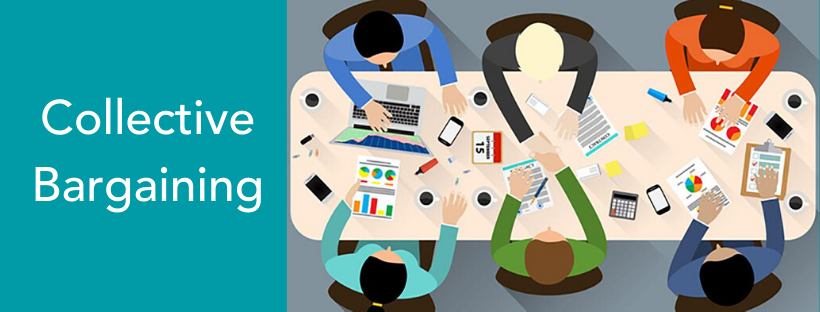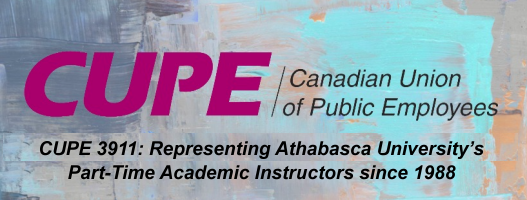CUPE 3911 is at the Bargaining Table with AU
Read below for general information on the Collective Bargaining process.
See the Grapevine, for updates & information as the status changes and becomes available.
What is Collective Bargaining?

Have you ever wondered how your terms and conditions of employment are determined? In short, they are negotiated with the employer, Athabasca University, through “collective bargaining” with your bargaining agent, CUPE 3911.
Once a union becomes certified to represent employees, an employer is legally required to bargain in good faith with them.This process is called Collective Bargaining.
The intended outcome of Collective Bargaining is to negotiate the contents of a collective agreement, which is the document that outlines the terms and conditions of employment.
These include things such as salaries, hours, health and safety, seniority, grievance process, employee rights, and all other matters that relate to the work conditions of the bargaining unit.
It is a mutual and legally binding contract that both parties (employer and union) must comply with.
Be sure to read it thoroughly because this is the document that contains your entitlements as rights as an AU employee.
A violation of this contract may result in grievances being filed by the local or our members.
Who is Involved?
Your Bargaining Committee is made up of several elected individuals from your local (employees of AU who are members just like you) and your CUPE National representative (full-time paid CUPE staff member whose job is to service locals like ours).
The committee is elected each year at our Annual General Meeting and any member may put their name forward to participate.
There is training available for those who are new to bargaining and we encourage you to get involved.
When and Where?
Collective agreements are typically for a one to two-year term and prior to expiry either party may serve notice to open bargaining. If notice is not served, the agreement automatically renews until the next open period where notice can be served. Although it is desirable to have meetings that are face-to-face, because of the nature of our bargaining unit being spread out throughout the province, we do supplement with teleconferencing and videoconferencing so that the process can continue despite our geographical challenges.
Although bargaining can take a long time, as long as there is discussion and movement, the process continues until a collective agreement, or an impasse is reached (and then next steps need to be considered). To compensate for the length of time it may take, the union tries to negotiate that any changes to articles in the final collective agreement be applied retroactively to the time that the last collective agreement expired.
What is the Bargaining Process?
So what happens once the union opens bargaining?
Protocols
First, the employer and the union meet to establish bargaining protocols – these are essentially rules of conduct that both sides agree on.
We established our protocols with AU this past fall before exchanging proposals.
One important protocol to note is confidentiality.
Both sides have agreed not to disclose specific details of what is discussed in bargaining and therefore we can only provide our members with general updates until we have a final document to put to a vote.
This is because bargaining is a fluid event – give and take and back and forth and providing a snapshot in time may not be accurate or may miss the overall dynamics that are occurring at the table. If you don’t hear too much from us about bargaining that’s probably why.
Request for Information
Bargaining is a forum that allows the union to request and obtain information from the employer to aid in the formulation of proposals. We sent a request form information with our request to open bargaining this past fall.
Proposals
Both sides prepare proposals. These are the documents that outline each party’s desired changes to the current collective agreement. Proposals are developed through a lot of work by the committee. This work includes researching other collective agreements in similar work environments as a comparison; conducting and analyzing member surveys to determine what issues are most important, and meeting (includes in person and via email) to discuss, develop and finalize. Our proposals, are usually divided into compensable and non-compensable items.
Mediation and Arbitration
If the parties reach an impasse, mediation is used to try and, resolve the issue. If it cannot be resolved in mediation, it will then proceed to a strike/lockout situation or to voluntary Arbitration, which is an alternate way to settle disputes without use of a strike or lockout but requires the agreement of both sides to undertake. The decision the Arbitrator becomes the collective agreement.
Memorandum of Agreement and Ratification
Once both sides have reached an agreement, they sign off and this document is then referred to as a Memorandum of Agreement. This memorandum must be ratified by both party’s constituents so both the CUPE members and the AU Board of Governors must ratify. CUPE conducts our ratification by sending the memorandum out and allowing you a chance to analyze the document, ask questions, and then vote on whether or not you agree to it. In the past, CUPE 3911 has always sent this by mail with a pre-paid envelope for members to return their vote. If you have moved recently, please make sure you update your address with AU.
The Right to Strike
CUPE 3911 members are non-designated academic staff, and therefore we fall under the Public Service Employees Relations Act (PSERA). Until a recent Supreme Court of Canada (SCC) decision, workers that fell under this Act were not able to strike. In compliance with the ruling of this SCC decision, the Alberta Government introduced Bill 4, also known as the Essential Services Act, which “allows for strikes and lockouts of public sector employees who were previously denied this right. This includes employees such as health care workers employed by Alberta Health Services and other approved hospitals, employees of the provincial government and agencies, boards and commissions and non-academic staff at post-secondary institutions.”(1)
Should any CUPE local go on strike, members are entitled to Strike Pay from CUPE National after 5 days and for a set amount of $300/week when they perform picket duty or other strike related work.
As legislation changes, so might the bargaining process. Be sure to refer back to our Bargaining section on our website for the latest information that relates to our local.
(1) http://www.employmentandlabour.com
Bargaining Update January 20, 2025
The Bargaining Committee is elected at our AGM and remains intact (except for changes as required) until bargaining has been completed.
The following are the members of our bargaining team:
Glynnis Lieb, CUPE L3911 Co-Chair
Mark Dimirsky, Grievance Officer
Ann Reynolds, Representative Officer
Ken Bolstad, Academic Expert, Faculty of Business
Jamie Loiselle, CUPE National Rep.
Keira Gunn, Consultant
The employer has indicated the following will be bargaining for them:
Chantel Kassongo, External Labour Consultant
Joanne Raycraft, Manager, Payroll and Benefits
Abey Arnaout, Labour Relations Specialist
Nichole Collins, Coordinator, Learning Services Tutorial
Anik Fehr, Labour Relations Specialist (Alternate
Pauline Smeltz, Deputy Chief Human Resources Officer (Alternate)
The Bargaining Committee will post periodically to the website to keep members informed.
Adhoc Membership Outreach Committee update
January 20, 2025
RE: Outreach to members in preparation for Bargaining 2024-25
As you may know, in the summer of 2024, we invited all of our members to fill out a survey to inform our bargaining team. We appreciate the many insights that 135 members provided to us. Initial results show wages and job security are the top priorities we have at this time. We’ve also initiated and arranged one-on-ones with 75 members so far, and we will be working hard to engage each of our 360+ members over the coming weeks and months.
Cutbacks are a serious problem across the entire post-secondary sector
Since spring 2019, when it was elected with a majority government, the United Conservative Party government has passed two budgets.
Both of these budgets are bad news budgets for the postsecondary sector as they include very deep cuts that are expected to extend for years without delay or pause.
The October 2019 budget decreased funding to the sector. And the most recent budget published at the end of February 2020 included a “transformative” 6.3% rollback in funding to postsecondary institutions.
The government has also continued with its plans to dramatically hike tuition fees, cut student aid, move to an outcomes-based “performance indicator” funding model for the sector, and to limit how much Alberta’s post-secondary institutions can spend, as per the McKinnon “Blue Ribbon Panel” report.
These factors all amount to significant headwinds for us as we prepare to enter into negotiations with the employer over our next contract.
So, we need your help.
We are inviting all members to get involved with the union in whatever way makes sense to you.
Please let us know if you’re interested in setting up a call or getting involved yourself in calling around to your co-workers.
This could involve joining our Ad-hoc Membership Outreach Committee to work on setting one-one-ones with your colleagues.
This could include attending our monthly General Membership Meetings (GMM) to get connected with what the union is working on, and to meet other active members in a low-stakes and fun venue (we meet on Zoom, which means you can join from your own living room!).
As well, we are always in need of content for our newsletter and our website – so if you have any ideas, please don’t hesitate to be in touch and get involved.
There’s much more work to be done. Of course, none of it could have been done without working together as colleagues to tackle head-on the common challenges we’re facing.
Chair
Ad-hoc Membership Outreach Committee (AMOC)
barretw16@gmail.com
